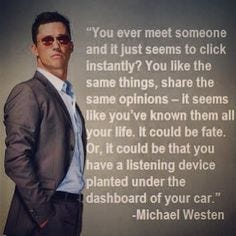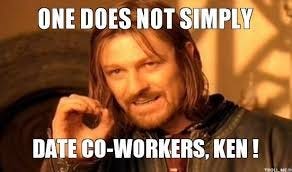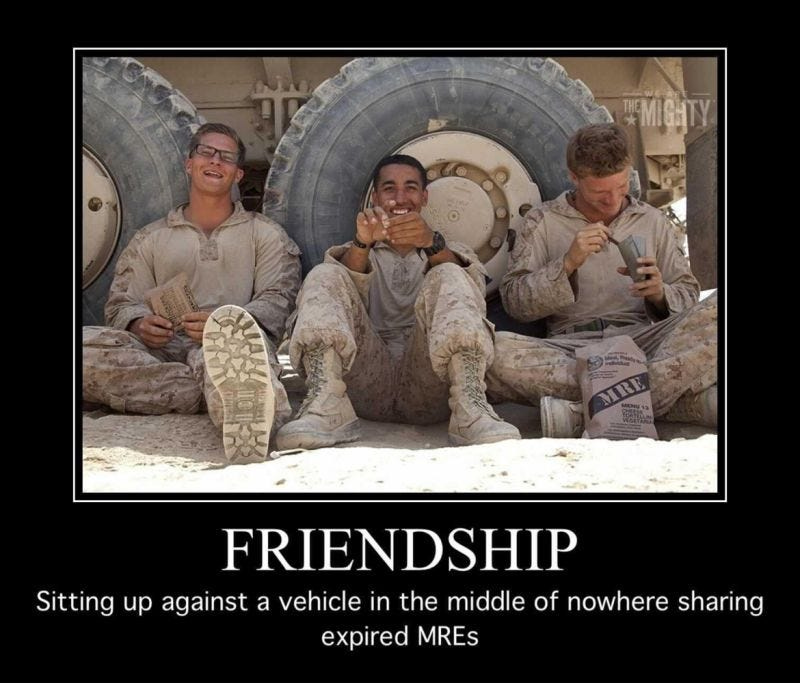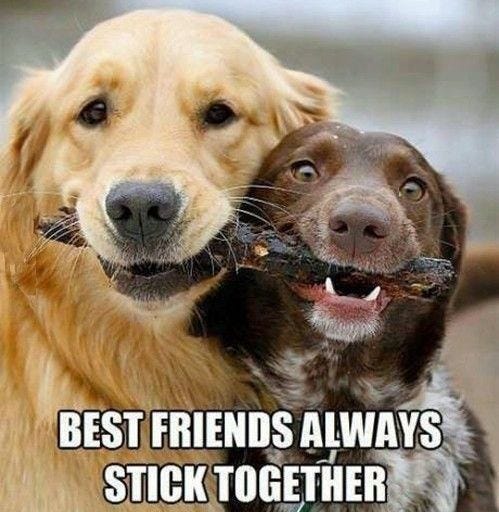How relationships work
Plus, Taylor Swift rejects Travis Kelce, a roofer who can’t go on the roof, and why Roger Sterling gets paid to make friends.
Danny told Amos that they weren’t friends anymore. Three days later, Amos called Danny and told him he had 3 months to live, so they’d better make up fast.
Amos is Amos Tversky, and Danny is Daniel Kahneman, and they’re arguably the 2 most important social scientists of the 20th century. If you haven’t heard of them, they invented the terms “confirmation bias” and “availability heuristic”. They also did a bunch of work together figuring out that humans aren’t as smart as we thought we were.
Both of them were brilliant. Both of them could have made important contributions to science on their own. But when they worked together, somehow their brains fused into a super-brain. Kahneman would say something to Tversky and Tversky would understand it even better than Kahneman did. As a result they did phenomenal work together. (If they had never met, we would probably still think humans were rational.)
Relationships are good for just about everybody (even grumpy introverts like the author of this article). Humans are a prosocial species, which means we’re kind of supposed to hang out with other humans. Everything is better when you have someone to ask for advice, eat with you, help you through your hard times, tell you when you’re being an idiot, watch a movie with you, and give you emotional support.
The problem is, our social structures have changed drastically over the past 80 years, making it harder to meet people and to build authentic connections. So today we’re terrible at relationships. We have fewer friends and fewer romantic partners than our grandparents did.
If you want to have fulfilling relationships in your life, it’s best to understand how relationships work. So here’s an article about how relationships work.
How relationships begin
If you’re trying to make friends, the worst thing you can do is introduce yourself to people and say “I’m trying to make new friends.”
Why? Because if you’re trying to make friends, then you must not have enough friends already — and if you don’t have enough friends, it suggests to people that there’s something wrong with you. Also, if you’re trying really hard to befriend someone, it will feel to them like you have an agenda. So it’s better if friendships develop by accident.
The same thing is true in the job market. If you put “open to work” in your LinkedIn bio, you actually get contacted by recruiters less often. That’s because recruiters assume that if you were good, you’d have a job already.
The same thing is true in dating. Many men complain that women find them way more attractive when they’re with their girlfriends. That’s because a man with a girlfriend is “pre-selected” —another woman already thinks he’s a high value romantic partner.
You can’t start a relationship deliberately, but you can start one by accident. Most relationships start when 2 people happen to need each other for some reason — they’re both traveling to the same place, or one is looking for a job and the other is looking for a front-end software engineer, or they need somebody to play Dungeons & Dragons with, or they both ordered a Venti Mocha Frappe at the same time and their eyes met.
In fact, many people don’t want to try using dating apps because they want to meet the love of their life by accident — that way, it feels more like a Hollywood love story. Trying to meet the love of your life feels like cheating.
If you really want to make a new friend, win over the love of your life, or make a new business contact, you might want to make the relationship feel like it started by accident. When they talk to women, pickup artists deliberately create “narrative”, or a romantic story that the woman they’re talking to can tell themselves about how they met. You can do the same thing: if you want to meet someone, try to accidentally bump into them and then come up with an excuse for why it makes sense for the two of you to hang out. That way you don’t seem like a stalker.
Also, try to maximize your chances of serendipitously meeting interesting people. I’m writing this at a mall in Bangkok where I go to play Blood On The Clocktower every Monday — which is a great way for me to meet other dorks. Similarly, if you want to meet work contacts, go to conferences and chat people up. If you want to meet women, go to dance classes and bars. Et cetera.
New friends vs. old friends
Early in a relationship, people have to decide whether they want to keep working together/hanging out. So they have to evaluate each other.
The problem is, they don’t know each other that well yet. Humans are really complicated, and if you just talk to somebody a few times, you’re only gonna know like 10% of what there is to know about them. That means early on in a relationship, people judge each other by first impressions and by reputations.
For example, in January I DM’d a YouTuber that I follow on Twitter. He told me that he had read some of my Medium articles, so he agreed to meet me for coffee. If I hadn’t written these articles, I would’ve been just another random weirdo in his DM’s, and he probably would have ignored me. But my articles gave me just enough of a reputation to be worth his time.
Once people get to know each other better, they can see past the rumors and the reputations and the first impressions, and get to the root of the human underneath.
For example, Taylor Swift originally rejected Travis Kelce, because she thought he wasn’t high-status enough for her. Then she got to know Kelce better, she realized that she really liked him, and now they’ve been together for almost a year. At the beginning their relationship was based on status; later their relationship was based on connection.

One of the consequences of this is that early in a relationship you have to focus on getting the other person to like you. You have to be a little superficial — because if you’re too vulnerable and authentic, it could cause the other person to misunderstand, misevaluate you, and stop hanging out with you. It’s incredibly risky to be genuine with someone before you know them well.
Ideally, you should try to get past the superficial stage quickly. The superficial stage is no fun. The real magic happens once you get to know somebody deeply.
Work, friends, love, and learning
There are basically 4 types of relationships: romantic relationships, professional relationships, mentorship relationships, and friendships. Friendships are the simplest: you’re friends with people because you have similar interests and you enjoy hanging out with them.
Professional relationships are about getting things done. Everybody has problems. To solve those problems, we have to trade with other people and we have to work alongside other people.
Romantic relationships happen because people have love chemicals in their brains that act the same way drugs do. So the same way that crack addicts are constantly looking for crack, people are constantly looking for love and/or sex. People of the opposite sex (or the same sex) make us feel good, and we’re always chasing that feeling.
Mentorship relationships happen because older people have an innate desire to teach stuff — teaching builds our status and makes us feel important — and because young people have an innate desire to learn stuff. If a student and teacher who have similar interests happen to meet and bond, they’ll often develop a deep connection.
Aside from family members, everyone you spend time with will fall into at least 1 of these 4 categories. If you make a list of all the people in your life, I’m willing to bet that for every single one, you either enjoy their company, they do something for you, you learn from them, and/or you want to date them/sleep with them. (If you can think of a counterexample, feel free to tell me.)
Mixing them together
Right now, my parents have a leaky roof. So they called the same roofer that they’ve used for the past 25 years.
This is in spite of the fact that that roofer is now too old to actually go up on the roof of their house. The roofer has to have one of his younger relatives go up on the roof to look for leaks.
In theory they should just get another roofer. But their current roofer is a good friend. They don’t want to cut him loose.
Another example: if you watch Mad Men, you’ll notice that most of Roger Sterling’s job is just having dinner with clients. Same thing with Peter Campbell and several other “account executives”.
Why would an advertising agency pay someone like Roger Sterling just to go to fancy dinners with their clients? Because the more dinners Roger Sterling has with them, the more he becomes their friend. And because Roger Sterling is their friend, they’re less likely to ditch him for another ad agency.
My parents’ roofer and Roger Sterling both have friendly professional relationships with their clients. They do jobs for each other and get paid for them. But they also enjoy each other’s company. In other words, they have mixed relationships.
Sometimes you can mix the 4 types of relationships together. The relationship always starts as 1 of the 4, and can branch out afterwards.
The way a relationship begins affects the way it mixes. For example, if you hire a secretary and then start dating her, your relationship will be quite different than if you start dating someone and then later hire her as your secretary.
In some cases, you should want to mix your relationships. That’s why Roger Sterling spends so much time making friends with his clients: when you’re friends with your clients, they’re less likely to drop you when times get tough.
Also, you can’t expect your marriage to work long-term if you’re not friends with your spouse. And you’ll get along better with your coworkers if you’re friendly with them. Et cetera.
But sometimes mixing your relationships is risky. Maybe your wife is great at quoting Shakespeare and raising kids, and you love watching movies with her on Friday night, but that doesn’t mean she can handle the stress of being your business partner. Maybe you do great work with a coworker, but that doesn’t mean you’re compatible as long term romantic partners. (This is why HR doesn’t like it when 2 coworkers start dating — it can mess things up.)
The 3 pillars of a relationship
If you want to have a good relationship with someone, you need to like, trust, and respect each other.
Trust is usually the most important. That’s because people screw each other over all the time. It’s best not to hang out with people unless you’re pretty confident that they’re honest and that they’re gonna treat you fairly.
This is one reason why people like to do business via referral. If you’re looking for a new doctor, plumber, gardener, electrician, or roofer, you ask your friends if they know a guy. When you meet your friend’s “guy”, you know that they’ve done a good job for your friend in the past. You also know that they have an incentive to not screw you over, because if they do, word will travel back to your friend.
Some people like to do business with their family members, for the same reason. Family members are generally more trustworthy because they have a Darwinian stake in your survival. So your family is less likely to screw you over. (Unless you have a really fucked up family!)

On top of trusting someone, you have to respect them. You have to think that they’re wise and skilled.
Respect is most important in mentorship relationships: if you don’t respect your mentor, you won’t listen to him. Respect is also super important in professional and long-term romantic relationships, where you need to count on your partner’s skills to solve tough problems. It’s least important in friendships and short-term romantic relationships: you can still date/be friends with alcoholics, bums, and losers, as long as they’re fun to hang out with.
Finally, it’s best if you actually like the person you’re dealing with. If you strongly dislike someone, thinking about them will create tremendous negative emotions.
Liking is least important in professional relationships, which are about getting things done. It’s most important in friendships and romantic relationships, which are about enjoying spending time with somebody.
But even in professional relationships, whether or not people like each other matters a lot. You can be far and away the best candidate for a job, but if the person interviewing you doesn’t like you, they usually won’t hire you.
One quick note: if you like someone, you’ll respect and trust them more, too. And vice versa. Psychologists call this the “halo effect”: if we see someone as having one good trait, we’ll usually see them as having many good traits. So if someone already likes you, you have to really blow it for them to not respect and trust you.
How do you get someone to like, trust, and respect you?
I’m writing this article from a café in Bali. The staff here is overly polite: they smile at me constantly and hold open doors for me.
Does that make me like, trust, and respect them? Not really.
It’s not enough to just be polite, because being polite is easy. Being polite sends no signal about your true personality, abilities, and intentions — it just means that you want somebody to like you. (If anything it makes me more suspicious of them: usually people who are over-the-top nice have an agenda.)
Generally, the best ways to get someone to like, trust, and respect you involve sending them some sort of costly signal. You have to do something that you could only do if you were worthy of being liked, trusted, and respected.
One way to build like, trust, and respect with someone is doing them a favor. The bigger the favor, the better. For example, last weekend I was staying in a hostel and I saw a couple people trying to help a super drunk guy walk down the stairs. They were having some trouble and it looked like they weren’t gonna be able to get him down. So I grabbed the drunk dude’s legs and we carried him to his bed. Afterwards, his friends offered to buy me a drink, and every time we saw each other for the rest of the weekend, we stopped and chatted.
Another way to build like, trust, and respect with someone is to have a really deep, emotional conversation with them. Once upon a time, someone went in to interview for a job. For 45 minutes, all he did was ask the interviewer personal questions (in a tactful way) and let him ramble. Afterwards, the interviewer offered the guy the job, even though the guy hadn’t said a single thing about himself.
Another thing that can build like, trust, and respect is doing difficult things with somebody. A good example is the military: when someone is shooting at you, you’re pretty damn grateful to everybody on your side who’s shooting back. Bonus points if somebody does something super courageous to help you or your squadron mates — and in the military, you have plenty of chances to do something courageous. That’s why people who fight wars alongside each other usually form lifelong bonds.
Also, when the stakes are high, people’s true selves tend to come out. During low-stress situations we wear masks: we try to appear kinder, more confident, and more capable than we really are. During high-stress situations, those masks fade away and our true selves come out.
Speaking of seeing somebody’s true self: another way to build like, trust, and respect is drinking or doing drugs together. Drinking and doing drugs is another way to strip off people’s masks and see who they really are. Plus, people are more fun to be around when they’re drunk/high. (This is also one reason why people will take it as an insult and shun you if you refuse to have a drink with them.)
Another thing that can build like, trust, and respect with someone is having something in common with them. If you grew up in the same hometown as somebody, or you went to the same college as them, or you like the same sports team, or you pray to the same god, then they’ll think of you as an ingroup member. They’ll therefore perceive you as more likable, competent, and trustworthy. (An extreme example: when I was 16 years old, I made friends with someone because we both wore a Jurassic Park T-shirt.)
How relationships stop
People change as they grow older, so sometimes it doesn’t make sense for them to hang out anymore. You probably have a few friends from when you were a kid who you’re not close with anymore. If you ran into them on the street, you’d say hi and be polite to them, but you might not invite them into your home.
Sometimes people stop hanging out because they have some irreconcilable difference. Maybe one of them becomes a hardcore wokeist and the other becomes a hardcore Trump guy.
Sometimes people stop hanging out because one of them betrays the other’s trust. If someone cheats on you or embezzles money from your bank account, you might not want to see them again.
Sometimes people just get frustrated with each other. This is what happened to Amos Tversky and Daniel Kahneman. (Fortunately, they made up before Amos died.)
The worst is when people just have a misunderstanding. One of them says something and the other feels insulted. And then they never talk about it, and there’s just this mounting tension in their relationship. Or one of them is too proud to apologize. In those cases an otherwise valuable relationship can come to an end.
So if somebody’s valuable to you, and you’ve had a rift in your friendship recently, then reach out to them, so you can solve the problem and bring them back into your life. Don’t worry about who’s “right” and who’s “wrong,” just make up. Good friends are hard to come by, so don’t throw them away.
Hi! Thanks for reading.
My name’s Theo and every Monday I publish an article about whatever was on my mind the week before. Usually related to how humans work.
If you liked this article and you’d like to see more of my writing, feel free to subscribe to my Substack here:
Happy trails!











